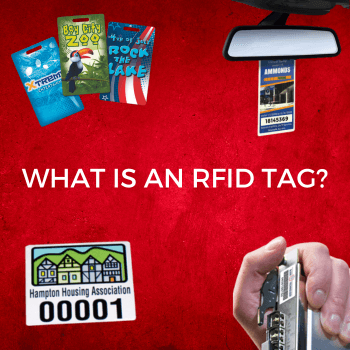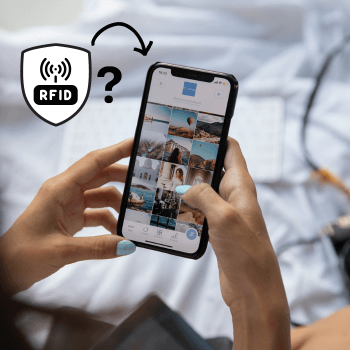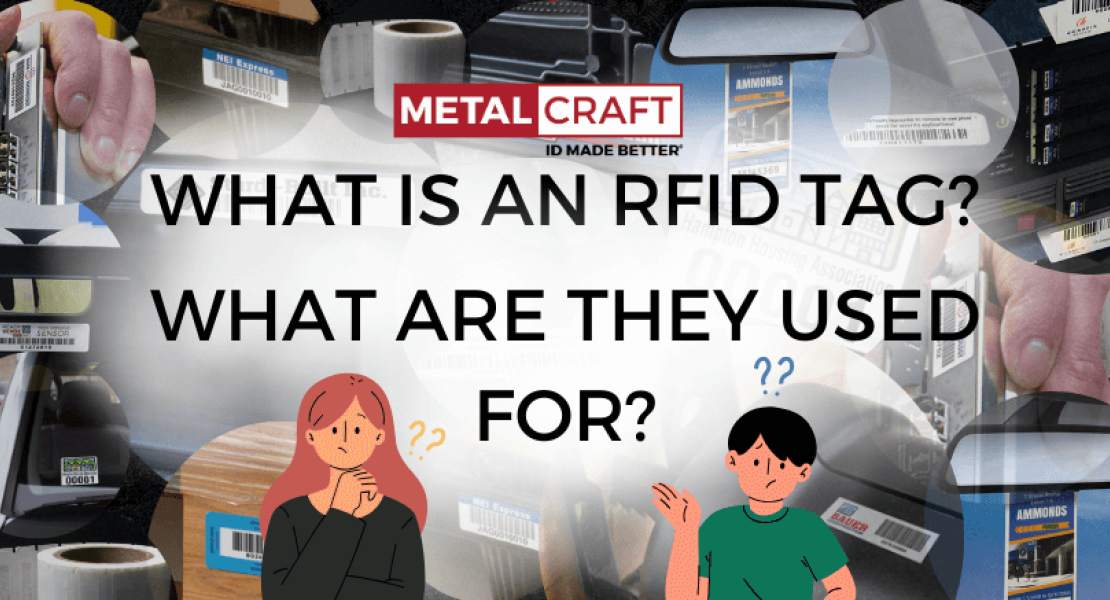What is an RFID Tag?
An RFID (radio frequency identification) tag is a small electronic device that consists of an RFID chip (microchip) and an antenna, designed to store and transmit data wirelessly using radio waves. These tags come in various forms, including adhesive RFID stickers, cards, key fobs, and embedded RFID chips. RFID tags are used across a wide range of industries for tracking and identifying objects, assets, and even living beings. Each tag contains a unique identifier that can be read by an RFID tag reader, allowing for quick and accurate data retrieval without the need for direct line-of-sight or manual scanning. This technology enables efficient inventory management, asset tracking, access control, and numerous other applications, making RFID labels an integral component of modern automated systems and IoT (Internet of Things) networks.
These tags come in various forms, including adhesive RFID stickers, cards, key fobs, and embedded RFID chips. RFID tags are used across a wide range of industries for tracking and identifying objects, assets, and even living beings. Each tag contains a unique identifier that can be read by an RFID tag reader, allowing for quick and accurate data retrieval without the need for direct line-of-sight or manual scanning. This technology enables efficient inventory management, asset tracking, access control, and numerous other applications, making RFID labels an integral component of modern automated systems and IoT (Internet of Things) networks.
What are RFID Tags used for?
RFID tags are used for various purposes across different industries due to the ability to uniquely identify and track items wirelessly. Some common applications of these tags include:
Inventory Management: RFID tags are extensively used in retail, warehouses, and supply chain management to track and manage inventory more efficiently. They enable businesses to automate inventory counting, reduce errors, and streamline the replenishment process.
Asset Tracking: RFID tags are used to track and manage assets such as equipment, tools, vehicles, and IT assets. This helps organizations keep track of the location and status of their assets, prevent loss or theft, and optimize asset utilization.
Access Control and Security: RFID tags are utilized in access control systems to grant or restrict access to buildings, rooms, and facilities. They are commonly found in key cards, access badges, and electronic locks, providing a convenient and secure way to manage entry and exit.
Transportation and Logistics: RFID tags are used in transportation and logistics to track shipments, containers, and pallets throughout the supply chain. They enable real-time visibility into the movement of goods, optimize route planning, and improve the efficiency of logistics operations.
Animal Tracking: RFID tags are implanted or attached to animals for identification and tracking purposes. They are used in livestock management, wildlife research, and pet identification, facilitating animal monitoring, disease control, and lost pet recovery.
Passport and Identity Verification: RFID tags are embedded in passports and identity documents to store biographical information and facilitate electronic identity verification at border crossings and immigration checkpoints.
Payment and Ticketing: RFID tags are used in contactless payment cards, transit cards, and electronic toll collection systems for quick and convenient transactions. They enable fast and secure payments without the need for physical contact or swiping.
Healthcare: RFID tags are used in healthcare for patient identification, medication tracking, and inventory management. They help healthcare facilities improve patient safety, prevent medication errors, and enhance operational efficiency.
Manufacturing and Production: RFID tags are employed in manufacturing and production processes for tracking work-in-progress, monitoring product quality, and managing inventory of raw materials and finished goods.
Supply Chain Traceability: RFID tags enable supply chain traceability by providing a digital record of product movements and transactions from manufacturing to distribution to end-users. This is particularly important in industries such as food and pharmaceuticals to ensure product quality, compliance, and safety.
Are RFID Tags anti-theft?
RFID tags can serve as an effective tool in anti-theft measures, particularly in retail settings. By embedding RFID labels into products or attaching them to packaging, retailers can track merchandise throughout the store, from stockrooms to checkout counters. This enables real-time monitoring of inventory levels and helps prevent theft by providing alerts if items are moved or leave designated areas without proper authorization. Additionally, RFID tracking technology can be integrated into theft detection systems at store exits, triggering alarms if tagged items are taken without being properly deactivated.
RFID labels into products or attaching them to packaging, retailers can track merchandise throughout the store, from stockrooms to checkout counters. This enables real-time monitoring of inventory levels and helps prevent theft by providing alerts if items are moved or leave designated areas without proper authorization. Additionally, RFID tracking technology can be integrated into theft detection systems at store exits, triggering alarms if tagged items are taken without being properly deactivated.
Can RFID Tags track you?
RFID stickers can have limited capabilities in tracking individuals compared to other technologies like GPS or cell phone tracking. RFID labels are typically used for tracking objects or assets rather than people. However, in certain contexts, such as access control systems or in identification cards, RFID tags may be associated with individuals. Nonetheless, for these tags to track individuals, they usually need to be within close proximity to RFID readers, typically within a few meters. This means that unless an individual is in the vicinity of an RFID reader, their movements cannot be tracked. Additionally, most tags do not have unique identifiers associated with personal information, limiting the potential for tracking individuals without additional data correlations. Despite these limitations, privacy concerns related to RFID technology persist, and proper safeguards must be implemented to protect personal information and privacy rights.
Can a phone block RFID?
Yes, phones have the capability to block RFID signals, although it usually requires specific features or accessories. Some smartphones are equipped with NFC (Near Field Communication) functionality, which operates on similar frequencies as RFID. However, NFC can be toggled on and off in phone settings, effectively blocking RFID signals when turned off. Additionally, certain phone cases or wallets are designed with RFID-blocking materials, such as metal, foil, or carbon fiber, which can prevent RFID signals from penetrating and accessing tags or cards stored inside. By using these features or accessories, individuals can enhance their privacy and security by blocking unwanted RFID scanning attempts.
Some smartphones are equipped with NFC (Near Field Communication) functionality, which operates on similar frequencies as RFID. However, NFC can be toggled on and off in phone settings, effectively blocking RFID signals when turned off. Additionally, certain phone cases or wallets are designed with RFID-blocking materials, such as metal, foil, or carbon fiber, which can prevent RFID signals from penetrating and accessing tags or cards stored inside. By using these features or accessories, individuals can enhance their privacy and security by blocking unwanted RFID scanning attempts.
How common is RFID theft?
RFID theft, also known as RFID skimming or electronic pickpocketing, is relatively uncommon compared to other forms of theft. While it is technically possible for thieves to intercept RFID signals from vulnerable cards or devices using specialized equipment, instances of this type of theft are infrequent. The adoption of security measures such as encryption and secure protocols in RFID technology has significantly reduced the likelihood of unauthorized access to sensitive information. Moreover, many credit cards, passports, and other RFID-enabled items now come equipped with protective features, such as RFID-blocking sleeves or wallets, further mitigating the risk of RFID theft. Despite its rarity, individuals should remain vigilant and take precautions to protect their personal information from potential RFID threats.
Can a smart phone detect RFID?
Yes, smartphones can detect RFID signals with the assistance of NFC (Near Field Communication) technology, which operates on similar frequencies as RFID. Many modern smartphones are equipped with NFC capabilities, allowing them to interact with tags and devices. With the appropriate apps installed, smartphones can read and write data to compatible tags, enabling various applications such as mobile payments, access control, and inventory management. While smartphones can detect RFID signals, their range and capabilities may be limited compared to dedicated RFID readers, typically extending only to a few centimeters. Nonetheless, the integration of NFC technology in smartphones has expanded the possibilities for utilizing RFID technology in everyday tasks and applications.
For more information on RFID Tags please contact us and one of our RFID Specialists would be happy to assist you.
 | About the Author: Aaron HobertAaron Hobert is our RFID Technical Specialist. Hobert joined Metalcraft in September of 1994 as a Litho Press Operator, became the Autograph Team Lead in 1998 and in April 2005 he became the RFID Sales Support Rep. He was named our RFID Technical Specialist in 2008. Aaron lives outside Charles City with his wife Diane. Mobile Phone: 641-330-2660 Email: [email protected] Office: 3360 9th St. SW, Mason City, IA 50401 Office Phone: 641-423-9460 |



